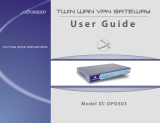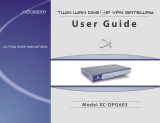
Table of Content
Introduction..............................................................................................................................................1
SAMPLE APPLICATION.....................................................................................................................2
FEATURES.............................................................................................................................................3
PARTS NAMES AND FUNCTIONS.......................................................................................................4
Factory Default Settings........................................................................................................................6
PASSWORD............................................................................................................................................6
LOCAL AND GLOBAL PORT ADDRESSES..........................................................................................6
INFORMATION FROM ISP...................................................................................................................6
Configuration via Web...........................................................................................................................8
GLOBAL PORT......................................................................................................................................9
CATV dynamic Mode.....................................................................................................................9
PPPoE (DSL dynamic Mode)....................................................................................................10
Static Mode...................................................................................................................................11
LOCAL PORT ......................................................................................................................................12
ADVANCED SETUP ...........................................................................................................................14
Management.................................................................................................................................14
Virtual Server...............................................................................................................................17
Packet Filters...............................................................................................................................19
Static Router.................................................................................................................................21
Check E-Mail................................................................................................................................23
Dynamic DNS................................................................................................................................24
NETWORK STATUS...........................................................................................................................25
WAN IP Status...............................................................................................................................25
Sessions List..................................................................................................................................25
Users List.......................................................................................................................................26
OTHERS...............................................................................................................................................26
Factory Reset................................................................................................................................26
Save Configuration.....................................................................................................................26
Firmware Upgrade......................................................................................................................28
Changing Password..............................................................................................................................29
FAQ.........................................................................................................................................................30
WHEN SHOULD I MODIFY THE MAC ADDRESS FOR GLOBAL PORT SETTINGS?....................30
WHAT IS DMZ?.................................................................................................................................30
WHAT IS DYNAMIC DNS?...............................................................................................................30
WHY "DYNAMIC DNS?"..................................................................................................................30
WHAT IS WILDCARD ?.....................................................................................................................30
WHAT’S MX (MAIL EXCHANGER)? AND WHY MX? .................................................................31
WHAT IS PPPOE (PPP OVER ETHERNET )?...................................................................................31
How can I know I am using PPPoE?........................................................................................31
IP ADDRESS CONFLICT......................................................................................................................31
CAN NOT ACCESS THE INTERNET..................................................................................................32
DIAGNOSIS..........................................................................................................................................33






















